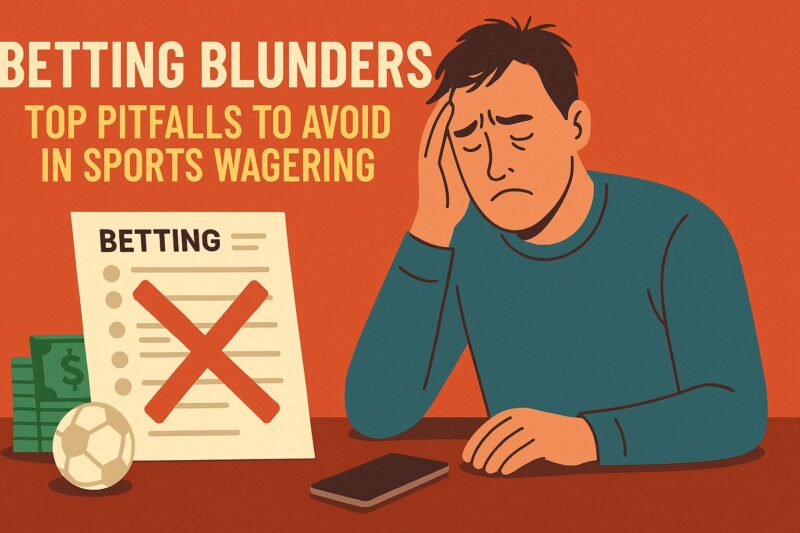In the electrifying world of sports wagering, the thrill of victory often dances tantalizingly close to the sting of defeat. While the allure of turning a passion for sports into profit can be irresistible, it’s easy to stumble into costly mistakes. From misreading the odds to chasing losses, even the most seasoned bettors can fall prey to common blunders that derail their success. This article delves into the top pitfalls to avoid in sports betting-offering a clear-eyed guide to navigating the highs and lows with strategy, discipline, and a touch of savvy. Whether you’re a rookie placing your first wager or a veteran sharpening your edge, understanding these frequent errors is key to making every bet count.
Common Psychological Traps That Derail Smart Betting
Even the sharpest bettors can find themselves caught in psychological snares that cloud judgment and lead to costly mistakes. One such trap is confirmation bias-the tendency to favor information that supports pre-existing beliefs while ignoring contradictory data. This selective perception might make you double down on a losing streak instead of stepping back to reevaluate your strategy. Staying objective requires conscious effort to question assumptions and seek out dissenting opinions.
Another common stumbling block is the sunk cost fallacy. This is the trap of continuing to invest in a losing bet just because of how much you’ve already wagered. Rather than cutting losses, bettors often hold onto hope that “one more bet” will recover previous losses. Recognizing when to walk away is crucial to preserving your bankroll and maintaining emotional balance.
Finally, emotional highs and lows can severely disrupt rational decision-making. The adrenaline from a big win may lead to reckless overconfidence, while frustration from losses can spark impulsive, revenge-driven bets. Managing your emotions through disciplined bankroll control and structured betting plans can help avoid these destructive cycles. Consider this quick reference table for key traps and their impact:
| Psychological Trap | Common Behavior | Impact on Betting |
|---|---|---|
| Confirmation Bias | Ignoring unfavorable stats | Stubborn, poor decisions |
| Sunk Cost Fallacy | Chasing losses repeatedly | Bankroll depletion |
| Emotional Betting | Impulse wagers after wins/losses | Inconsistent results |
Misreading Statistics and Overvaluing Recent Performance
In the heat of the moment, it’s easy to fall into the trap of overanalyzing recent games or hot streaks and projecting that success infinitely into the future. This cognitive bias can severely distort your judgment, making you bet heavily on teams or players who seem “unstoppable” right now but may be skating on thin ice beneath the surface. Remember, a handful of good performances don’t necessarily signal a lasting trend-sports outcomes are deeply influenced by fluctuating conditions, injuries, and even psychological states.
Another common misstep is misinterpreting statistical data, often by taking numbers at face value without context. For example, a player’s high scoring average might look impressive, but what if that was accumulated mostly against weaker opponents? Or perhaps a team’s recent win streak came during home games, where they typically perform better. Failing to consider these nuances can cause you to misread the true likelihood of future results, turning otherwise sound metrics into misleading signals.
| Statistic Type | Potential Misinterpretation |
|---|---|
| Recent Wins | Overestimating sustained form |
| Player Averages | Ignoring opponent quality |
| Home vs. Away Performance | Neglecting venue influence |
To avoid these pitfalls, always supplement raw statistics with deeper insights: look for underlying trends rather than surface numbers, examine the quality of opposition faced, and consider external factors like travel burdens or team morale. Treat statistics as tools for informed betting-not as oracles of certainty. By maintaining a critical eye on recent performances and understanding the real story behind the numbers, your wagers will be grounded in reality, not just fleeting impressions.
Ignoring Bankroll Management and Setting Unrealistic Limits
One of the most critical mistakes many bettors make is neglecting proper bankroll management. Without a clear plan to control your funds, it’s easy to fall into the trap of chasing losses or placing bets that are too large for your current financial standing. This reckless approach often leads not only to rapid depletion of your gambling budget but also to increased stress and poor decision-making during crucial moments.
Setting limits that don’t align with your real wagering capacity only magnifies these risks. For instance, betting a disproportionate percentage of your bankroll on a single game might seem tempting when the odds look favorable, but it’s akin to gambling blindfolded. A well-structured limit system includes predetermined stakes, loss limits, and win goals that encourage discipline and longevity in sports wagering.
Consider these smart bankroll management rules to stay on track:
- Risk no more than 1-5% of your bankroll on any single bet
- Define daily or weekly loss limits to avoid emotional overspending
- Set realistic expectations and avoid the temptation to ‘make up’ for losing streaks
| Bankroll Size | Recommended Bet Size |
|---|---|
| $100 | $2 – $5 |
| $500 | $5 – $25 |
| $1,000 | $10 – $50 |
The Danger of Chasing Losses and Emotional Decision Making
When losses pile up, the temptation to quickly recover what’s been lost can cloud judgment and undermine sound strategy. This emotional response, often called chasing losses, pushes bettors to take irrational risks, such as increasing bet sizes drastically or placing wagers on unfamiliar markets. Instead of methodical analysis, decisions become impulsive gambles driven by frustration or desperation, turning a temporary setback into a catastrophic spiral.
Understanding the psychological traps involved is crucial. Emotions like anger or regret can distort perception, causing bettors to believe they’re due for a win or that a losing streak is “just bad luck”-when in reality, losing runs are part of the game. This mindset often leads to ignoring key data points, such as team form or injury updates, simply because the urge to recoup losses overpowers rational thought. Recognizing this emotional bias is the first step toward maintaining discipline.
Effective ways to avoid falling into this trap include:
- Setting strict loss limits before betting sessions
- Taking deliberate breaks after consecutive losses to reset mindset
- Keeping a detailed betting journal to track decisions and outcomes objectively
- Using pre-established staking plans rather than chasing bigger payoffs
| Emotion | Typical Behavior | Consequence |
|---|---|---|
| Frustration | Placing large unwarranted bets | Rapid bankroll depletion |
| Overconfidence | Ignoring analysis in favor of “gut feeling” | Repeated avoidable losses |
| Regret | Rushing to “make up” lost bets | Chasing losses endlessly |
Failing to Shop for Value and Compare Odds Across Bookmakers
One of the most overlooked mistakes bettors make is settling for the first odds they find without looking further to identify the best value. Different bookmakers often offer varying odds for the same event, and failing to shop around can significantly impact your potential returns over time. It’s crucial to remember that even small differences in odds can add up, turning a slight edge into long-term profit or loss.
Smart bettors practice:
- Comparing odds across multiple platforms before placing a bet
- Utilizing odds comparison websites and apps to save time
- Keeping track of bookmaker promotions that enhance value on specific bets
| Bookmaker | Team A Odds | Team B Odds |
|---|---|---|
| Bookmaker 1 | 1.85 | 2.10 |
| Bookmaker 2 | 1.95 | 2.00 |
| Bookmaker 3 | 1.80 | 2.15 |
As shown in the table above, the difference in odds between bookmakers can be quite noticeable. Sticking to just one bookmaker without comparing means you might miss out on better payouts or enhanced offers elsewhere. By consistently seeking out the best prices, you not only maximize your winnings but also gain an edge over less diligent bettors who ignore this critical step.
Q&A
Q&A: Betting Blunders – Top Pitfalls to Avoid in Sports Wagering
Q1: What are some of the most common betting blunders beginners make in sports wagering?
A1: Beginners often fall into traps like chasing losses, betting on their favorite teams regardless of odds, and neglecting proper bankroll management. Emotional decisions, rather than data-driven ones, tend to lead to poor outcomes early on.
Q2: How does chasing losses impact a bettor’s bankroll?
A2: Chasing losses means increasing bet sizes to recover lost money quickly. This can spiral into larger losses, depleting the bankroll faster and increasing financial risk. Sustainable sports wagering requires discipline, not desperation.
Q3: Why is bankroll management crucial in sports betting?
A3: Proper bankroll management acts as a financial safety net. It ensures that even during losing streaks, the bettor can continue wagering without risking ruin. Staking consistent, reasonable amounts relative to your total funds helps maintain longevity in betting.
Q4: Can overconfidence in one’s knowledge lead to betting mistakes?
A4: Absolutely. Overconfidence can cause bettors to overlook critical data or ignore external factors affecting outcomes. Assuming you “know it all” might lead to placing rash bets without proper analysis.
Q5: How important is researching teams, players, and conditions before placing a bet?
A5: Invaluable. Success in sports wagering hinges on informed decisions. Understanding team form, injuries, weather conditions, and even venue can drastically affect the probability of certain outcomes.
Q6: What role do emotions play in betting blunders?
A6: Emotions can cloud judgment. Betting while angry, overly excited, or anxious often results in impulsive and irrational wagers. Maintaining a calm, objective mindset is key to avoiding costly errors.
Q7: Are there pitfalls related to the types of bets placed?
A7: Yes. Beginners might be tempted by complicated bets or parlays with attractive payouts but poor odds. Simpler bets with realistic chances of winning tend to be more effective in building consistent profits.
Q8: How can bettors avoid falling for bad advice or misleading tips?
A8: Critical thinking and skepticism are essential. Verify information from multiple reputable sources and avoid blindly following hot tips, especially from unverified or biased sources.
Q9: Is there a common misunderstanding about “getting rich quick” through sports betting?
A9: Definitely. Many enter sports wagering expecting instant riches, but the reality involves patience, strategy, and disciplined risk-taking. Viewing betting as a long-term endeavor helps prevent reckless gambling.
Q10: What final piece of advice would help bettors steer clear of major pitfalls?
A10: Treat sports wagering like a business rather than a hobby or a gamble. Set clear goals, stick to your strategy, manage your bankroll wisely, and always bet with your head-not your heart. Avoiding these common blunders can transform betting from a losing game into an enjoyable and potentially profitable experience.
To Conclude
As with any venture into the unpredictable world of sports betting, awareness and caution are your best allies. Recognizing common pitfalls allows you to navigate the betting landscape more confidently, turning potential pitfalls into stepping stones toward smarter wagering. Remember, success in sports betting isn’t just about luck-it’s about strategy, discipline, and continuous learning. So, approach each bet with a clear mind and cautious optimism, and may your future wagers be guided by insight rather than impulse. Happy betting, and may your choices always be informed!



